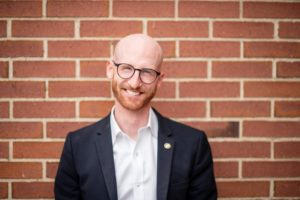Representation Matters: State Senator Derek Kitchen

This is part of The Humanist’s monthly series highlighting openly nonreligious elected officials across the nation. Because of the work of the Center for Freethought Equality, the political and advocacy arm of the American Humanist Association, there are now ninety elected officials at the local, state, and federal level who identify with the atheist and humanist community serving in thirty states across the country. Join the Center for Freethought Equality to help politically empower the atheist and humanist community—membership is FREE!
The Center for Freethought Equality’s advances have been groundbreaking. Prior to the 2016 election, there were only five state legislators and no members of Congress who publicly identified with our community; because of its efforts, we have sixty state legislators today—a twelve-fold increase–and a member of Congress, Jared Huffman (CA-2), who publicly identify with our community! It is critical that our community connect and engage with the elected officials who represent our community and our values—you can see a list of these elected officials here.
State Senator Derek Kitchen
Representing Senate District 9 in Utah
“As a humanist, my focus is on taking care of the people in my district, which is why I look at all issues through the lens of how it impacts our quality of life.”
Senator Kitchen grew up in Salt Lake City, Utah and graduated from the University of Utah in 2013 with a degree in political science. He was elected to the Utah legislature in 2018, becoming the youngest member of the Utah State Senate and the only openly LGBTQ+ member of the legislature. He was elected to serve in the 2019-2020 Utah State Minority Leadership as Senate Caucus Manager, and currently serves on eight committees. His legislative work has focused on affordable housing, climate reform, and anti-discrimination laws. In 2019, he completed Harvard’s program for Senior Executives in State and Local Government as a David Bohnett LGBTQ Victory Institute Leadership Fellow.
Kitchen was a member of the Salt Lake City Council from 2015 to 2018, where he led the effort to create an historic $21 million fund to generate affordable housing in October 2016. Before his election to public office, Senator Kitchen and his partner sued the State of Utah to obtain marriage equality in Kitchen v. Herbert, which they won in 2014. The case brought marriage equality to Utah and five other western states in the 10th Circuit.
While still in college, Kitchen opened a food distribution company, Laziz Foods. Four years later, he co-founded a Lebanese restaurant, Laziz Kitchen, which works to hire refugees in partnership with the International Rescue Committee (IRC).
In addition to his professional work, Senator Kitchen has long been an active member of his community. While on the City Council, he volunteered as the Chair of the Salt Lake City Redevelopment Authority. He currently serves on the board of the Utah Museum of Contemporary Art.
Sarah Levin: What motivated you to run for office?
Derek Kitchen: I was motivated to run for office because I want to advocate for the well-being of my community. When I was twenty-three years old, I got my start in the political world by suing the state of Utah in federal court for marriage equality (Kitchen v. Herbert, 2013). That experience taught me that, even in a place like Utah, when we take a risk and stand up for what is right, we can make big changes. I kept that momentum going by running for city council in 2015, and then for the State Senate in 2018. I am up for re-election on June 28.
Levin: What are your policy priorities and how does your nonreligious worldview impact your policy platform?
Kitchen: My policy priorities are focused on quality of life issues in my community. For instance, Utah is growing really fast. We are experiencing all kinds of pressure on critical infrastructure, our roads, schools, and even our air quality. When it comes to religion, I don’t think it has any role in government other than someone’s individual beliefs. As an elected official, it is important that we find ways to separate our personal preferences from our decision making, especially for the whole community that I represent. As a humanist, my focus is on taking care of the people in my district, which is why I look at all issues through the lens of how it impacts our quality of life.
Levin: Why was it important for you to be open about your nonreligious identity?
Kitchen: Honestly, my non-religious identity isn’t a big part of my life. I have been a non-believer since I first learned how to think for myself. I grew up in a very Mormon state and, for me, it always felt like religion took up too much space in conversations around the community. I believe in separation of church & state and that, while people are entitled to believe whatever they want, it should not be front and center in our government. So that said, I don’t talk about my non-religious views unless it comes up or I need to push back on hyper-religious perspectives in conversations.
Levin: How did voters respond (if at all) to your openness about your nonreligious identity?
Kitchen: Voters seem to be more concerned about Republican overreach in our state government. It seems that my non-religious identity and views are not a concern for voters in my district. It makes me feel good to know that my voters never ask about my religion and have never expressed a concern about my non-religious identity. I think they respect that I know what I believe and that I’m not shy about my authentic self. I believe it gives them confidence in me as a leader in Utah.
To learn more about State Senator Derek Kitchen, visit:
